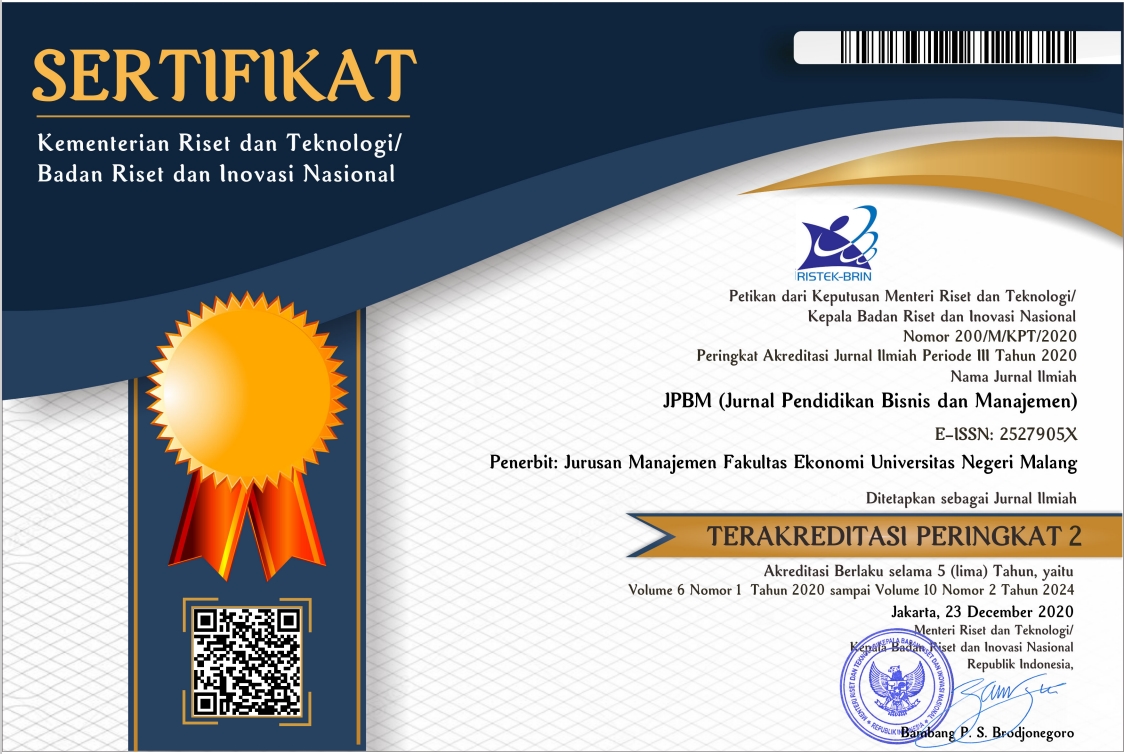Transformational Leadership and Organizational Citizenship Behavior: Exploring the mediation of Organizational Learning Culture and Organizational Justice
Abstract
Keywords
Full Text:
PDFReferences
Agarwal, P. (2016). Redefining the organizational citizenship behaviour. International Journal of Organizational Analysis, 24(5), 956–984.
Alamir, I., Ayoubi, R. M., Massoud, H., & Hallak, L. Al. (2019). Transformational leadership, organizational justice and organizational outcomes: A study from the higher education sector in Syria. Leadership and Organization Development Journal, 40(7), 749–763.
Aldag, R., & Reschke, W. (1997). Employee value added: Measuring discretionary effort and its value to the organization. Center for Organization Effectiveness, Inc, 1–8.
Ali, N. (2016). Effect of Organizational Justice on Organizational Citizenship Behavior: A Study of Health Sector of Pakistan. Review of Public Administration and Management, 04(03), 1–9.
Arar, K., & Nasra, M. A. (2019). Leadership style, occupational perception and organizational citizenship behavior in the Arab education system in Israel. Journal of Educational Administration, 57(1), 101–116.
Bass, B. M., & Bass, R. (2008). The Bass Handbook of Leadership (Fourth Edi). New York: The Free Press.
Basu, E., Pradhan, R. K., & Tewari, H. R. (2017). Impact of organizational citizenship behavior on job performance in Indian healthcare industries. International Journal of Productivity and Performance Management, 66(6), 780–796.
Belwalkar, S., Vohra, V., & Pandey, A. (2018). The relationship between workplace spirituality, job satisfaction and organizational citizenship behaviors – an empirical study. Social Responsibility Journal, 14(2), 410–430.
Blau, P. M. (1964). Exchange and Power in Social Life. New York: John Wiley & Sons, Inc.
Chen, H., & Jin, Y. H. (2014). The effects of organizational justice on organizational citizenship behavior in the chinese context: The mediating effects of social exchange relationship. Public Personnel Management, 43(3), 301–313.
Chiaburu, D. S., Oh, I. S., Berry, C. M., Li, N., & Gardner, R. G. (2011). The five-factor model of personality traits and organizational citizenship behaviors: A meta-analysis. Journal of Applied Psychology, 96(6), 1140–1166.
Chin, W. W. (1998). The partial least squares approach for structural equation modeling. In G. A. Marcoulides (Ed.), Methodology for business and management. Modern methods for business research (pp. 295–236). London: Lawrence Erlbaum Associates Publishers.
Eberlin, R. J., & Tatum, C. B. (2008). Making just decisions: Organizational justice, decision making, and leadership. Management Decision, 46(2), 310–329.
Fornell, C., & Larcker, D. F. (1981). Evaluating structural equation models with unobservable variables and measurement error. Journal of Marketing Research, 18(1), 39–50.
García-Morales, V. J., Jiménez-Barrionuevo, M. M., & Gutiérrez-Gutiérrez, L. (2012). Transformational leadership influence on organizational performance through organizational learning and innovation. Journal of Business Research, 65(7), 1040–1050.
Ghozali, I. (2014). Structural Equation Modeling: Metode Alternatif dengan Partial Least Square (Keempat). Semarang: Badan Penerbit Universitas Diponegoro.
Gibson, J. L., Ivancevich, J. M., Donnelly Jr, J. H., & Konopaske, R. (2012). Organizations, Behavior, Structure, Processes (Fourteenth). New York: McGraw-Hill Irwin.
Hair, J. F., M.Hult, G. T., M.Ringle, C., & Sarstedt, M. (2017). A primer on partial least squares structural equation modeling (PLS-SEM) (2nd Ed). Los Angeles: SAGE Publications, Inc.
Hakim, W., & Fernandes, A. (2017). Moderation effect of organizational citizenship behavior on the performance of lecturers. Journal of Organizational Change Management, 30(7), 1136–1148.
Hambali, M., & Idris, I. (2020). Transformational Leadership, Organizational Culture, Quality Assurance, and Organizational Performance: Case Study in Islamic Higher Education Institutions (IHEIS). Jurnal Aplikasi Manajemen, 18(3), 572–587.
Han, S. H., Seo, G., Yoon, S. W., & Yoon, D.-Y. (2016). Transformational leadership and knowledge sharing: Mediating roles of employee’s empowerment, commitment, and citizenship behaviors. Journal of Workplace Learning, 28(3), 130–149.
Hanif, M., & Endang, S. (2018). the Influence of Transformational Leadership, Organizational Justice, Trust and Organizational Commitment Toward Employees’ Performance. Russian Journal of Agricultural and Socio-Economic Sciences, 82(10), 118–131.
Hoftstede, G. (2001). Culture’s Consequences: Comparing Values, Behaviors, Institutions and Organizations Across Nations (Second Edition). London: SAGE Publications Inc.
Idris, I., & Adi, K. R. (2019). Transformational Leadership and Team Performance: The Role of Innovation in Indonesia Property Agent Industry. Advances in Economics, Business and Management Research, 101(Iconies 2018), 334–338.
Idris, Setiawan, M., Susilowati, C., Supriyanto, A. S., Ekowati, V. M., & Muhammad, F. (2020). Examining the role of political skill in transformational leadership and organizational performance: Empirical study from Indonesia. SMART Journal Business Management Studies, 16(2), 124–132.
Imran, M. K., Ilyas, M., Aslam, U., & Ubaid-Ur-Rahman. (2016). Organizational learning through transformational leadership. Learning Organization, 23(4), 232–248.
Islam, T., Khan, M. M., & Bukhari, F. H. (2016). The role of organizational learning culture and psychological empowerment in reducing turnover intention and enhancing citizenship behavior. Learning Organization, 23(2–3), 156–169.
Islam, T., Khan, S. U. R., Ahmad, U. N. U., & Ahmed, I. (2014). Exploring the Relationship Between POS, OLC, Job Satisfaction and OCB. Procedia - Social and Behavioral Sciences, 114, 164–169.
Jafari, P., & Bidarian, S. (2012). The Relationship Between Organizational Justice and Organizational Citizenship Behavior. Procedia - Social and Behavioral Sciences, 47, 1815–1820.
Kim, E. J., & Park, S. (2019). The role of transformational leadership in citizenship behavior: Organizational learning and interpersonal trust as mediators. International Journal of Manpower, 40(7), 1347–1360.
Lim, B. T. H., & Loosemore, M. (2017). The effect of inter-organizational justice perceptions on organizational citizenship behaviors in construction projects. International Journal of Project Management, 35(2), 95–106.
LKjIP. (2019). Laporan Kinerja Instansi Pemerintah (Government Agency Performance Reports) RSUD. dr. R. Koesma Kabupaten Tuban. (accessed August 20, 2020).
Mackenzie, S. B., Podsakoff, P. M., & Rich, G. A. (2001). Transformational and Transactional Leadership and Salesperson Performance. Journal of the Academy of Marketing Science, 29(2), 115–134.
Maharani, V., Surachman, Sumiati, & Sudiro, A. (2017). The effect of transformational leadership on organizational citizenship behavior mediated by job satisfaction and organizational commitment (study at Islamic Bank in Malang Raya). International Journal of Economic Research, 14(3), 205–218.
Markoczy, L., & Xin, K. (2004). The Virtues of Omission in Organizational Citizenship Behavior. In Draft Version 1.28 (Issue August 24).
Marsick, V. J., & Watkins, K. E. (2003). Demonstrating the Value of an Organization’s Learning Culture: The Dimensions of the Learning Organization Questionnaire. Advances in Developing Human Resources, 5(2), 132–151.
Nguni, S., Sleegers, P., & Denessen, E. (2006). Transformational and transactional leadership effects on teachers’ job satisfaction, organizational commitment, and organizational citizenship behavior in primary schools: The Tanzanian case. School Effectiveness and School Improvement, 17(2), 145–177.
Núñez, A. R., Marquez, E., Zayas, M., & López, E. (2020). Relationship between organizational citizenship and commitment in Puerto Rico banks. International Journal of Sociology and Social Policy, 40(7–8), 643–658.
Obedgiu, V., Nkurunziza, G., Simiyu, G., & Lubogoyi, B. (2020). An investigation of key predictors of organizational citizenship behavior of civil servants: Empirical evidence from Uganda. International Journal of Organization Theory and Behavior, 23(2), 101–119.
Organ, D. W. (1988). Organizational citizenship behavior: the good soldier syndrome. MA: Lexington Books.
Paterson, J. M., Green, A., & Cary, J. (2002). The measurement of organizational justice in organizational change programmes: A reliability, validity and context-sensitivity assessment. Journal of Occupational and Organizational Psychology, 75(4), 393–408.
Podsakoff, M. P., MacKenzie, S. B., Paine, B. J., & Bachhrach, D. G. (2000). Organizational Citizenship Behaviors: A Critical Review of the Theoretical and Empirical Literature and Suggestions for Future Research. Journal of Management, 26(3), 513–563.
Podsakoff, N. P., Whiting, S. W., Podsakoff, P. M., & Blume, B. D. (2009). Individual- and Organizational-Level Consequences of Organizational Citizenship Behaviors: A Meta-Analysis. Journal of Applied Psychology, 94(1), 122–141.
Podsakoff, P. M., Mackenzie, S. B., Moorman, R. H., & Fetter, R. (1990). Transformational leader behavior and their effects on followers’ trust in leader, satisfaction, and organizational citizenship behaviors. Leadership Quarterly, 1(2), 107–142.
Robbins, S., & Judge, T. A. (2017). Organizational Behavior. In Fortune (17 Global). Pearson Education.
Rodrigues, A. de O., & Ferreira, M. C. (2015). The Impact of Transactional and Transformational Leadership Style on Organizational Citizenship Behaviors. Psico-USF, 20(3), 493–504.
Salas-Vallina, A., Alegre, J., & Fernández, R. (2017). Organizational learning capability and organizational citizenship behaviour in the health sector: examining the role of happiness at work from a gender perspective. International Journal of Health Planning and Management, 32(2), e137–e159.
Sani, A., Ekowati, V. M., Wekke, I. S., & Idris, I. (2018). Respective contribution of entrepreneurial leadership through organizational citizenship behaviour in creating employee’s performance. Academy of Entrepreneurship Journal, 24(4), 1–11.
Saoula, O., Johari, H., & Fareed, M. (2018). A conceptualization of the role of organisational learning culture and organisational citizenship behaviour in reducing turnover intention. Journal of Business and Retail Management Research, 12(4), 126–133.
Schilpzand, M. C., Martins, L. L., Kirkman, B. L., Lowe, K. B., & Chen, Z. X. (2013). The relationship between organizational justice and organizational citizenship behaviour: The role of cultural value orientations. Management and Organization Review, 9(2), 345–374.
Shahin, A., Naftchali, J. S., & Pool, J. K. (2014). Developing a model for the influence of perceived organizational climate on organizational citizenship behaviour and organizational performance based on balanced score card. International Journal of Productivity and Performance Management, 63(3), 290–307.
Somech, A., & Drach-Zahavy, A. (2004). Exploring organizational citizenship behaviour from an organizational perspective: The relationship between organizational learning and organizational citizenship behaviour. Journal of Occupational and Organizational Psychology, 77(3), 281–298.
Supriyanto, A. S., Ekowati, V. M., Idris, I., & Iswanto, B. (2020). Leadership Styles as a Predictor of the Voluntary Work Behaviors of Bank Employees. International Journal of Economics and Management, 14(1), 1–11.
Tepper, B. J., & Taylor, E. C. (2003). Relationships among supervisors’ and subordinates’ procedural justice perceptions and organizational citizenship behaviors. Academy of Management Journal, 46(1), 97–105.
Tran, T. B. H., & Choi, S. B. (2019). Effects of inclusive leadership on organizational citizenship behavior: the mediating roles of organizational justice and learning culture. Journal of Pacific Rim Psychology, e13(17), 1–11.
Tziner, A., & Sharoni, G. (2014). Organizational citizenship behavior, organizational justice, job stress, and workfamily conflict: Examination of their interrelationships with respondents from a non-Western culture. Journal of Work and Organizational Psychology, 30(1), 35–42.
Refbacks
- There are currently no refbacks.
JPBM (Jurnal Pendidikan dan Bisnis Manajemen) is licensed under a Creative Commons Attribution-NonCommercial-ShareAlike 4.0 International License.
JPBM (Jurnal Pendidikan dan Bisnis Manajemen) is abstracted and indexed in :

















